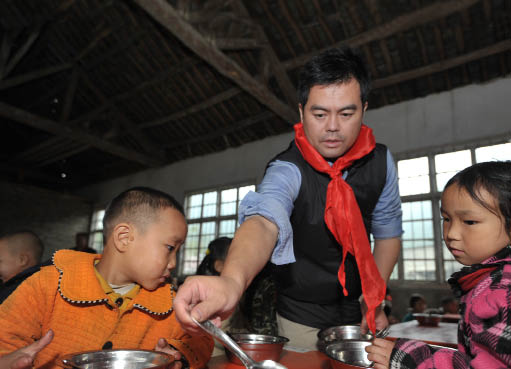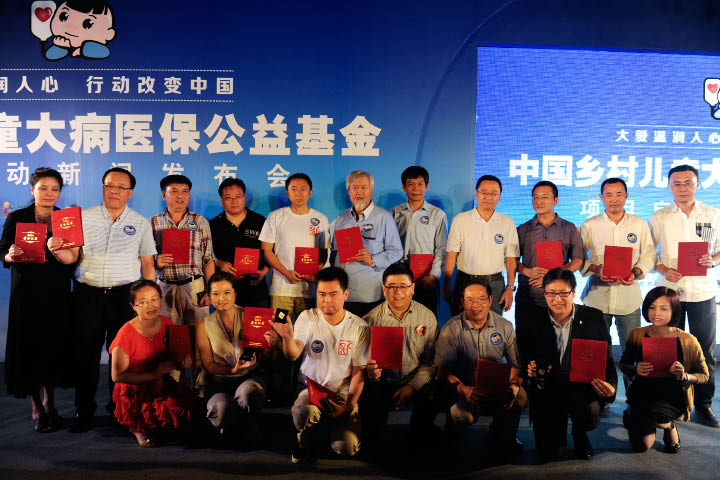Lunches and Medical Insurance for Impoverished Kids
By staff reporter LI YUAN
DENG Fei had just flown back from a mountainous area when we met him. He and others had been setting up the Free Lunches for Children project. Since launching this project for students in poverty-stricken areas, Deng has taken no rest from his self-imposed punishing schedule, heading back and forth from remote rural areas to cities like Guangzhou, Guiyang, Changsha, and Beijing, where he organizes sponsors for his scheme.
Born in 1978 in Hunan Province, Deng Fei was a well-reputed journalist before embarking on the Free Lunches for Children project. During a decade-long career he wrote more than 100 reports on major social issues, notably the protection of women and children’s rights, and corruption. Deng focused his attention on vulnerable groups, eventually prompting him in 2011 to set up a public charity. The move transformed his social role from that of observer of social problems to an organizer of charitable programs.
 |
| Shaba Primary School in Qianxi County, Guizhou Province, was the first school covered by the free lunches program. |
Microblog-sponsored Charities
Deng hit on the idea of the Free Lunches for Children project in February 2011, after meeting a volunteer teacher at a primary school in a poverty-stricken county of Guizhou Province. He was appalled to learn from the teacher that his students did not eat lunch and drank only cold water to suppress hunger. Two weeks later, Deng did research in Guizhou and found that this was a common phenomenon. It was clear that students in these areas desperately needed help to claim their fundamental right to a hot midday meal.
Rather than report his findings in the media, Deng instead turned to microblogs for help. A year before he had tested the power of the Internet through microblogging. He successfully used a blog to help a man named Peng Gaofeng locate his missing three-year-old son.
“I wrote what I had observed and my related thoughts on my microblog, and it sparked off a wave of support and donations. This heartening reaction spurred me on to more action,” Deng Fei said.
The project to provide free lunches to children in rural mountain areas thus began with an initial response of 500 supporters from media circles.
Through Deng’s microblog, news of the project spread further to celebrities and entrepreneurs. Two months later, Shaba Primary School in Qianxi County of Guizhou became the first school in China to provide free lunches. Six months later, hot lunches became available to children in 110 rural schools of 13 provinces.
The instantaneous success of the Free Lunches for Children caught the attention of the central government. In October 2011, the State Council took the decision to execute an official plan to improve the nutrition of rural students receiving nine-year compulsory education. It involved the central government’s allocation of RMB 16 billion to subsidize free lunches for around 26 million students in 680 counties and cities.
Wang Zhenyao, president of the Philanthropy Research Institute of Beijing Normal University, spoke highly of the non-governmental Free Lunches for Children project. “In the final analysis, charity is a kind of soft power of which free lunches are a perfect expression,” Wang said. “Instead of blaming and finger-pointing, Deng does his wholehearted utmost to solve a real problem. It is this kind of rational approach to social problems that garners support from policy-makers,” Wang said.
Although the government has now taken over responsibility for the free lunch project, Deng believes that it still needs private support to ensure that every penny of the government’s RMB 16 billion is spent on food for children. “We want to provide other support facilities not included in the central government’s budget, such as kitchenware and refrigerators, cooks’ salaries, and funds for canteen construction,” Deng said.
 |
| Deng Fei (third left, front row) among other sponsors of the major diseases insurance program for rural children. |

